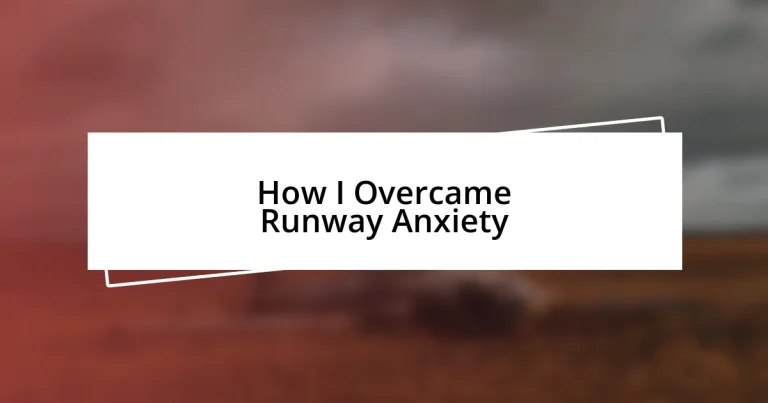Key takeaways:
- Runway anxiety encompasses fear and self-doubt, often linked to self-worth; confronting it starts with self-affirmation and community support among models.
- Identifying specific anxiety triggers, such as comparison to others and fear of judgment, helps in managing and preparing mentally for runway experiences.
- Utilizing effective breathing techniques and visualization strategies can significantly alleviate anxiety and enhance performance, transforming fear into confident expression.
- Building a supportive network with fellow models and mentors provides essential encouragement and validation, helping to navigate the pressures of the modeling industry.

Understanding Runway Anxiety
Runway anxiety is a complex blend of fear and self-doubt that many models experience before stepping onto the catwalk. I vividly remember waiting behind the curtains, my heart racing and palms sweating, questioning if I was truly ready for the spotlight. It’s fascinating to think about the pressure of not just performing well, but also the intense scrutiny that accompanies that moment.
What often strikes me is how runway anxiety is not just about being in front of an audience; it’s also tied to our perceptions of self-worth and talent. There were times I felt defeated before I even walked, wondering if I’d make a misstep or if everyone was judging me harshly. Have you ever felt that way? That uncertainty can be paralyzing, yet in those moments, I discovered the importance of self-affirmation and focusing on my journey rather than the judgment of others.
Acknowledging runway anxiety is the first step toward overcoming it. I learned that sharing my feelings with fellow models created a sense of camaraderie, transforming what felt isolating into a collective experience. It’s astonishing how many of us face the same fears; you start to realize that you’re not alone in this. When we connect, we can support each other, turning anxiety into a powerful motivator rather than a barrier.

Identifying Triggers of Anxiety
Identifying the triggers of runway anxiety was an eye-opening process for me. I had to pay attention to the specific situations and thoughts that ignited my anxiety before a show. Sometimes, it was the size of the audience or a particular dress I was wearing that made me feel exposed. Other times, it was fleeting thoughts about past auditions or critical comments I’d overheard. By recognizing these patterns, I was able to confront them head-on, allowing me to prepare mentally in a more focused way.
Here’s a list of common anxiety triggers I discovered along the way:
- Comparison to Others: Seeing fellow models with their confidence could amplify my self-doubt.
- Performance Pressure: The responsibility I felt to meet expectations often loomed large.
- Fear of Judgment: Worrying about what the audience or industry professionals might think weighed heavily on my mind.
- Previous Experiences: Reminders of past mistakes or mishaps on the runway would pop into my thoughts, adding to the pressure.
- Physical Discomfort: Tight clothing or high heels highlighted my unease and made me focus on my body rather than the performance.
By examining these triggers, I began to take steps to manage my anxiety, creating a toolkit of strategies that empowered me.

Effective Breathing Techniques
When I first started dealing with runway anxiety, breathing techniques became my secret weapon. They’re surprisingly powerful! One method I found particularly effective is the 4-7-8 breathing technique. It involves inhaling for four seconds, holding your breath for seven, and exhaling for eight. The moment I applied this practice backstage, I noticed a tangible shift in my focus. Suddenly, I wasn’t just another model; I was empowered and centered. Have you ever tried this technique? I encourage you to give it a go next time you’re feeling anxious.
Another technique that worked wonders for me is diaphragmatic breathing. Instead of just using my chest to breathe, I learned to fill my belly with air. It’s a bit like inflating a balloon. I remember standing in front of the mirror, trying it out before stepping onto the runway. The deeper breaths helped me ground my energy, so I wasn’t just anxious energy awaiting release. Instead, I entered the runway with a sense of calm confidence, transforming my nervousness into that exciting thrill of performing.
To sum it up, these breathing techniques not only alleviated my anxiety but also enhanced my performance. I remember the first time I used these methods right before a show—I was filled with an exhilaration that turned what could have been a dreadful moment into one of my most cherished experiences. Breathing truly is a game-changer.
| Technique | Description |
|---|---|
| 4-7-8 Breathing | Inhale for 4 seconds, hold for 7, exhale for 8. |
| Diaphragmatic Breathing | Deep belly breathing that fills the abdomen with air. |

Visualization Strategies for Confidence
Visualizing success became a pivotal strategy in combating my runway anxiety. Before each show, I took a few quiet moments to imagine myself strutting confidently down the runway, radiating poise and grace. I could almost feel the warmth of the spotlight and the applause from the audience, which transformed the entire experience from one of fear to anticipation. Have you ever found that simply picturing your success can shift your entire mindset?
As I honed my visualization skills, I learned to craft vivid mental images that included every detail—from the fabric of my outfit to the expression on my face. In one memorable instance, just before a particularly daunting show, I locked myself in a dressing room and vividly visualized every step I’d take, right down to how I’d interact with the audience. It was like I was rehearsing not only my walk but also my confidence. The result? I stepped onto that runway feeling as though I had already won.
I’ve also found it helpful to combine visualization with affirmations. Standing in front of the mirror, I’d say things like, “I belong here,” or “I am a radiant presence on the runway.” This simple technique heightened my belief in myself and helped create a powerful self-image. The connection between visualization and emotional well-being is undeniable—what you see in your mind, you can often manifest in reality. Isn’t it fascinating how our thoughts can shape our experiences?

Preparation Methods for Success
Preparing mentally and physically is crucial for anyone facing runway anxiety. I discovered that creating a detailed pre-show routine helped me mentally gear up for the experience. Before each show, I would put on my favorite playlist—music that made me feel unstoppable—creating an energizing atmosphere that shifted my mood. Have you ever noticed how a good song can lift your spirits in an instant?
Another method that significantly contributed to my success was practicing my runway walk ahead of time. I remember spending hours in front of my full-length mirror, perfecting each stride while wearing the shoes I would sport during the show. This repetition gave me muscle memory and allowed my body to move confidently when it was time to step out. By the time I hit the runway, the walk felt second nature. Doesn’t it feel rewarding to see all that hard work pay off in real-time?
On the mental side, I found keeping a journal invaluable for tracking my thoughts and feelings leading up to the shows. I would jot down my anxieties and, more importantly, affirmations about my capabilities. One day, I stumbled upon an entry that said, “Every step on the runway is a step toward my dreams.” That simple reminder helped ground me and allowed me to transform those previously overwhelming feelings into excitement. Do you ever write down your thoughts to clarify your feelings? It can be incredibly enlightening!

Post-Runway Reflection and Growth
After each runway show, I took time to reflect on my experience. One particular show stands out; I felt overwhelmed with anxiety leading up to it, but once I hit the runway, something clicked. I remember standing backstage, breathing deeply, and reminding myself of my visualizations, which helped me realize that every walk was a step toward growth, not just a performance. Have you ever experienced that moment of clarity when everything suddenly feels right?
This post-show reflection wasn’t just about what I could improve; it was also a celebration of my victories, no matter how small. Each time I faced my fears, I felt a little stronger and more assured. I would sit in my room afterward, sometimes with a cup of tea, and journal about what went well and what I learned. I believe this process solidified my confidence further—transforming anxiety into a powerful motivator. How do you celebrate your achievements in the face of challenges? I find that acknowledging my progress is key to nurturing my growth.
With every reflection, I recognized a pattern emerging: anxiety was gradually losing its grip on me. In those moments of quiet contemplation, I gained insight into my strengths and areas for growth. Sure, there were setbacks, but they were stepping stones rather than roadblocks. This growth mindset changed the way I approached future shows, prompting me to see each runway as an opportunity for further development. Isn’t it amazing how reframing our experiences can lead to profound personal growth?

Building a Supportive Network
Building a supportive network proved to be one of the most effective strategies in overcoming my runway anxiety. I reached out to fellow models who understood the pressures of the industry and shared their own experiences with similar fears. There was something incredibly comforting about hearing someone say, “I’ve been there too.” Have you ever felt that instant relief when someone validates your feelings?
Additionally, I found that having a reliable mentor offered guidance and encouragement. My mentor helped me navigate tough moments and provided tips on managing anxiety. I remember her saying, “It’s okay to be scared; just don’t let it stop you.” This phrase stuck with me and reminded me that vulnerability is part of the journey. Have you found a mentor who inspires and uplifts you?
Moreover, I made it a point to engage with my friends and family for emotional support. I would invite my closest friends to watch my rehearsals, cheering me on from the sidelines. Their presence transformed what could have been a daunting experience into something more enjoyable and engaging. It became a shared moment of joy, rather than a solitary struggle. How do you include your loved ones in your personal challenges? For me, their unwavering support was a game-changer.














